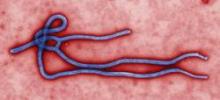Standard barrier nursing protocols that have been in place in the United States since recognition of HIV will be adequate to protect health care workers in the unlikely event that patients who contracted the Ebola virus in Africa present to a U.S. emergency department or physician’s office, officials from the Centers for Disease Control and Prevention said during a July 28 press briefing.
Since March, 672 people have died during the ongoing Ebola outbreak in Western Africa, according to Dr. Steve Monroe, director of the CDC Division of High-Consequence Pathogens and Pathology.
Two health care workers, both in Monrovia, Liberia, have presented with Ebola. One is symptomatic and in isolation; the other has fever but no other symptoms.
Transmission of the virus to health care workers seems to have occurred via needle stick or contact with infected bodily fluids, according to Dr. Monroe. Some health care workers on the ground in Western Africa use only "rudimentary" safety precautions against infection, he noted.
In 2008, two cases of Marburg virus infection occurred in Western Europe. Marburg is a hemorrhagic fever virus that is a close cousin to Ebola, Dr. Monroe noted. Both patients were managed by way of standard barrier nursing precautions already in place, and those precautions were sufficient to protect physicians and nurses involved in their care.
"If a case [of Ebola] were to show up in the United States, I’m confident that we are already doing what needs to be done to prevent virus transmission to health care workers," he said.
The disease cannot be spread by asymptomatic people, according to Dr. Monroe. And if a symptomatic person travels on an airplane, it is unlikely that fellow travelers will be exposed to infected bodily secretions, he added.
One case of an Ebola patient traveling by air has been noted. The man flew from Liberia to Lagos, Nigeria, where he died. The countries involved in the outbreak have stepped up efforts to screen for fever and other signs of the disease those travelers who seek to leave their countries. Only 50% of infected people present with hemorrhage; others present with the vague symptoms of fever, headache, muscle aches, and vomiting.
It is extremely unlikely that Ebola will spread outside of Africa. But, to err on the side of caution, the CDC has issued a Level 2 travel notice. Dr. Marty Centron, director of CDC Division of Global Migration and Quarantine, said the Level 2 notice does not involve any travel restrictions. It advises the traveling public to take sensible, enhanced precautions.
The CDC’s involvement in dealing with the Ebola outbreak, partnering with the World Health Organization and the health agencies of the three African countries involved, will be more of a marathon than a sprint, given how hard it can be to eradicate the virus, Dr. Monroe noted. Reseeding of regions where outbreaks seemed to be over is common, much like a wildfire that seems to have been extinguished can erupt from unexpected hot spots.

